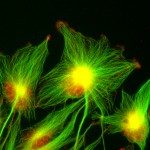Lien vers Pubmed [PMID] – 18840525
Curr. Opin. Neurobiol. 2008 Oct;18(5):488-94
Glial cells, which include myelinating oligodendrocytes, Schwann cells and astrocytes, fulfil a large variety of functions that are critical for the development, functioning and regeneration of neurons. Some of these glial functions have been shown to require polarization of the intracellular machinery. Although the initial signals leading to glial cell polarization during development and in the adult are not completely elucidated, crucial molecules such as proteins of the extracellular matrix and their membrane receptors have been identified. A general picture of the intracellular signalling pathways controlling polarity in glial cells is also emerging and shows that highly conserved and ubiquitously expressed polarity proteins are involved.

